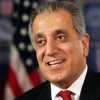Zalmay Khalilzad

Zalmay Khalilzad
Zalmay Mamozy Khalilzadis a U.S. counselor at the Center for Strategic and International Studiesand president of Khalilzad Associates, an international business consulting firm based in Washington, D.C. He was the United States Ambassador to the United Nations under President George W. Bush. He has been involved with U.S. policy makers at the White House, State Department and Pentagon since the mid-1980s, and was the highest-ranking Muslim American in the Administration of U.S. President George W. Bush. Khalilzad's previous assignments in...
NationalityAmerican
ProfessionPolitician
Date of Birth22 March 1951
CountryUnited States of America
The neighbors can make it harder. It can take longer. But success is inevitable. This country has the resources to become a very rich and powerful country. It behooves the neighbors of Iraq to help.
The country is bleeding. Iraqis want their leaders to rise to the occasion, to form a government of national unity.
Americans have eliminated Iran's worst enemies, the Taliban in Afghanistan and Saddam [Hussein]. I occasionally threatened my Iranian counterpart in Kabul that one day I would send him a big bill for what we did. But, seriously, Iran is pursuing a dual strategy in Iraq. On the one hand, the Iranians, after decades of hostility, are now interested in good relations. On the other hand, they want to keep the country weak and dominate the region.
The feeling of being an Iraqi unites all ethnic groups within this country. Even the Kurds, who have traditionally pushed for their own state, see the benefits of the current situation. They enjoy an autonomous status in Kurdistan, while at the same time participating in decisions in Baghdad. But if neighboring states were to push for a partition of Iraq, it would be a horrible mistake.
The Sunnis continue to see themselves, possibly for nostalgic reasons, as the most influential group and want a stronger central government - quite unlike minorities in other countries. The circumstances here are far more complex than many people in Washington imagine.
We're going to press very hard for this.
It is a moment of danger but also a moment of opportunity.
It is critical that the newly elected leaders of Iraq do their part by forming a government of national unity with a good program and competent ministers as soon as possible.
That will bring down the total level from 17 brigades to 15.
will depend not only on our military strategy, but also on the political progress.
I think American impatience has to do with the notion that we don't know what we're doing. If we could project that we are moving in the right direction, Americans are ready to be very patient.
We have opened the Pandora's box and the question is, what is the way forward? If another incident (occurs), Iraq is really vulnerable.
We are doing all that we can to help bring about a release and will persist with that.
The U.S. and Iraq will work together next year to shift Iraqi resources from unproductive subsidies to productive uses that enable Iraqis to earn livelihoods.